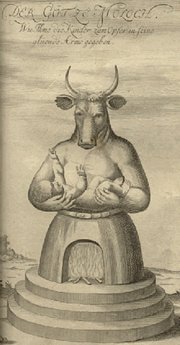Molech
From Plastic Tub
| Revision as of 19:53, 14 May 2005 Undule (Talk | contribs) ← Go to previous diff |
Revision as of 19:55, 14 May 2005 Undule (Talk | contribs) format Go to next diff → |
||
| Line 1: | Line 1: | ||
| - | [[Category:Personages]]__NOTOC__ | + | [[Category:Personages]] |
| - | [[Image:Molech.jpg|thumb|right|Molech, devourer of children, has proven a popular mainstay in occult circles.]] | + | <table width="100%" border="0" align="right" cellpadding="4" cellspacing="0"> |
| - | + | <tr> | |
| + | <td width="*" align="left" valign="top">__NOTOC__ | ||
| In Jewish traditions, Molech (מלך) has been interpreted as a god, perhaps referred to as "the king," since biblical times. In 1921, German archeologists proposed that the word referred to a type of human sacrifice in certain Carthaginian cities. | In Jewish traditions, Molech (מלך) has been interpreted as a god, perhaps referred to as "the king," since biblical times. In 1921, German archeologists proposed that the word referred to a type of human sacrifice in certain Carthaginian cities. | ||
| Line 14: | Line 15: | ||
| So began [[Stimso Adid|Stimso Adid's]] exhaustive psychoanalytic study of Molech, ''The Oral God''. | So began [[Stimso Adid|Stimso Adid's]] exhaustive psychoanalytic study of Molech, ''The Oral God''. | ||
| - | |||
| - | == Desiderata == | ||
| - | |||
| - | ---- | ||
| - | In the twentieth century, Molech has served as a popular metaphor in the arts. He features prominently in Allen Ginsberg's ''Howl'' and in Fritz Lang's ''Metropolis''. | ||
| == Non-Canonical Text == | == Non-Canonical Text == | ||
| Line 31: | Line 27: | ||
| * [[God]] | * [[God]] | ||
| * [[The Sponsor]] | * [[The Sponsor]] | ||
| + | </td> | ||
| + | <td width="180px" align="left" valign="top" bgcolor="#CCCCCC" style="margin: 0 0 1em 1em; background: #E0E0E0; border: 1px #aaa solid; border-collapse: collapse; font-size: 100%;"> | ||
| + | [[Image:Molech.jpg|thumb|center|Molech, devourer of children, has proven a popular mainstay in occult circles.]] | ||
| + | == Desiderata == | ||
| + | |||
| + | ---- | ||
| + | <font style="font-size: 92%"> | ||
| + | In the twentieth century, Molech has served as a popular metaphor in the arts. He features prominently in Allen Ginsberg's ''Howl'' and in Fritz Lang's ''Metropolis''. | ||
| + | |||
| + | </font> | ||
| + | </td> | ||
| + | </tr> | ||
| + | </table> | ||
Revision as of 19:55, 14 May 2005
|
In Jewish traditions, Molech (מלך) has been interpreted as a god, perhaps referred to as "the king," since biblical times. In 1921, German archeologists proposed that the word referred to a type of human sacrifice in certain Carthaginian cities. Molech, or Moloch, appears in medieval demonology as a Prince of Hell. This medieval Molech specializes in stealing children. It is likely that this was inspired by the ancient belief that babies were sacrificed to him. In the twentieth century, Molech has served as a popular metaphor in the arts. He features prominently in Allen Ginsberg's Howl and in Fritz Lang's Metropolis. Extrapolation"Molech is a horrible beast, a soul-eater and a right bastard." So began Stimso Adid's exhaustive psychoanalytic study of Molech, The Oral God. Non-Canonical TextMolech enjoys notable ubiquity in the gnarled tradition of medieval Christian demonology; in fact, he appears as a kind of Superstar Prince of Hell, emboriodered with an astonishing variety of descriptive illumination. His province was believed, as expected, to be th realms of fire, war and curiously, dreams. In this latter capacity, Molech was alternately known as Mommu, a slight perversion of the Sumeria Mamu, the Lord of Dreams. See Also |
DesiderataIn the twentieth century, Molech has served as a popular metaphor in the arts. He features prominently in Allen Ginsberg's Howl and in Fritz Lang's Metropolis.
|

